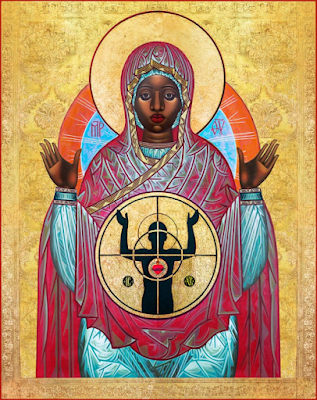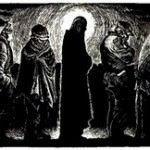 |
| "Our Lady of Ferguson and All Those Killed by Gun Violence" |
A Meditation on Matthew 25:31ff
Sunday, December 12, 2021
1.
First, let’s gather to our hearts the family of Vincenzo (Vinny) Lirosi, who died last weekend here in Durham. Vinny was a UNH student, and a son, and a roommate and a friend. And his death breaks the hearts of all who loved him, and the community that promised to keep him safe. So, God, have mercy on all who grieve: and gather Vinny into the arms of everlasting love.
And then, I want to remember with you those who died in yet another school shooting in Michigan this month. Their names were Tate, Hana, Madyson and Justin. I heard this week that a prosecutor is holding the shooter’s parents accountable for that violence; he was 15 and apparently had 18 rounds of ammunition left at the moment he was arrested.
But the NRA—maybe you heard this—the NRA is ready to wage an all-out media campaign to keep parents from having to lock up their semiautomatic weapons safely. Apparently, the gun lobby’s goal is a loaded gun in every home, in every bedroom, by every bedside, ready to do damage at any time. We are so very afraid of one another, and our hearts and homes are something like fortresses now. And for some reason I will never understand, we’ve ordained the dysfunctional gun lobby to make us safe and whole. And for all of that, we’ve lost another quartet of bright young lives in another traumatized American school. Again, their names were Tate, Hana, Madyson and Justin.
And then, in Chiapas, Mexico, this week, a truck carrying over 100 migrants, barreling down a hill, seeking to avoid detection at all costs, overturned: and 55 of those migrants—mothers, fathers, sons, daughters—were killed. They were from villages, families in Guatemala, El Salvador, Honduras. From worlds shattered by dictators and poverty and (if we’re honest) American ambition and economic policy. And all they wanted, these 55, was a life of opportunity and peace. A school to teach their kids. A church to love and serve. A neighborhood to call home.
I have to believe in a God who weeps: a God whose heart breaks for the 55 in Chiapas, and the four in Michigan, and for Vinny here at UNH. I have to believe in a God who weeps. It’s the only way God makes any sense to me. It’s the only way I can trust God with my own brokenness, with my own anger, and with my faith.
2.
And what of our gospel then? What kind of hope is this? What kind of imagination meets us in this text?
In Jesus’ parable this morning, the king says to those at his right hand: “Come, you that are blessed by God, inherit the kingdom prepared for you from the foundation of the world; for I was hungry and you gave me food, I was thirsty and you gave me something to drink, I was a stranger and you welcomed me.” It’s this last phrase that moves me this morning, this third Sunday in Advent. “I was a stranger and you welcomed me.” With Jesus it’s always about open doors, and open hearts, and open arms. The secret of Christian theology is hospitality. Not some obscure 4th century doctrine. The secret of Jesus’ practice is communion. Not some rigid fundamentalist dogma. “I was hungry and you gave me food. I was thirsty and you gave me something to drink. I was a stranger and you welcomed me.”
In the Greek of Matthew’s text, in the Greek that first shows up in the early church, that verb (welcomed me) is actually the Greek verb “syn-a-gog-ia.” I was a stranger and you welcomed me: is really—I was a stranger and you ‘synagogued’ me. We hear the word ‘synagogue’ in there, of course, and so would the earliest believers have heard just that. ‘Synagogue.’ The synagogue is the community of worship, the community of faith and practice, the community of leaders called to manifest courage and compassion and service. The synagogue is where the action is. The congregation.
So the call in Matthew 25 isn’t simply to open the door; it’s not simply to hand out a blanket or a can of beans. The call here is to ‘synagogue’ the stranger: to incorporate her into a loving, empowering community; to recognize her gifts and amplify her voice; to raise her up as a leader, to train her as a servant. Do you see how this might be the heart and soul of our own mission? What synagogues do. What congregations do.
I’m thinking about what Kristin Forselius is doing with our youth this winter: raising up leaders, empowering their energies and service, amplifying their voices. And taking them to the Arizona desert--to the border--to understand it for themselves. And I’m thinking about what Peggy Kieschnick and Debbie Leavitt are doing with our Immigrant Advocacy Team: assembling a team, training that team in advocacy, weaving varied energies into a single fabric, a strong network committed to transformation, to solidarity, to the kin-dom of God.
The call in Matthew 25, and in our own church, is to ‘synagogue’ the stranger. To ‘synagogue’ the seeker. To ‘synagogue’ the long-time church goer and the curious visitor alike. It begins with open doors, with open hearts, with open arms. That’s for sure. But the Matthew 25 church moves on to build a beloved community; to nurture and embolden that community; to collaborate with long-timers and strangers; to collaborate with pillars of the church and brand new, off-the-bus seekers in the joyful project of Christian discipleship and service. “I was hungry and you gave me food. I was thirsty and you gave me something to drink. I was a stranger and you welcomed me.” We are called to synagogue one another! We are called to church one another! And all of that’s what it means—for Jesus, at least—to love one another. Community and communion.
3.
And why, in the end, is this an Advent theme? Why is this a Christmas text with a Christmas message? Because, my friends, Christmas is a season of incarnation and embodiment. Christmas is our annual celebration of the embodiment of God, the embodiment of Mercy in the life and human form of the child. The child of Mary of Nazareth. But we miss the full impact of this gospel, Christ’s gospel, if we stop reading at the point where the angels sing in the skies and the magi lay their gifts by his manger. There are 28 chapters in Matthew’s story. The magi leave town in chapter 2.
This morning’s parable—you have to read almost all the way to the end of Matthew’s story—this morning’s parable celebrates the incarnation of God in you and me, and in the synagogues we build together. This morning’s parable celebrates the embodiment of Mercy in you and me, and in the communities we create with the hungry and the thirsty in our streets, and with the stranger who risks everything at our borders, and with the incarcerated friend who’s looking for another chance.
In our grieving, then, for those 55 siblings who died in Chiapas this week, maybe we can hear the voice of Jesus himself calling us to brotherhood and sisterhood—with migrants around the world, with refugees seeking asylum right here on the Seacoast, and with a dynamic and devoted church community dedicated to hospitality and hope. And in our weeping, then, for the four teens who died in Michigan last month, maybe we can hear the Christmas gospel—yes, the Christmas gospel! It calls us to brotherhood and sisterhood, to righteous anger and disciplined purpose—with dedicated teachers and loving families, with all our children and neighbors in every city and every land. We can turn our swords into plowshares and our automatic weapons into better schools and better communities and a better future. We can become the change we wish to see in the world.
So this morning, when you take the Body of Christ into the palm of your hand, don’t be afraid to confess your own hunger. Don’t be afraid to acknowledge the aching in your heart, the brokenness in your body, the yearning in your soul. This ritual—our communion—isn’t a religious transaction, as if that would do us any good. No, no. It’s a sacrament, this communion: a sign of God’s grace and a promise of the world’s transformation. And the wonder and possibility and mercy in your life. Christ is among you, within you, even there in your hand in that simple, tiny bit of bread. Christ is born in you and in me, and most importantly in us. To feed our hungry spirits. To awaken our hopeful hearts. And to draw us to one another, to invite us to share energies and resources, and to build a synagogue of mercy and the merciful, a church of friends and friendship, a beloved community where Mary’s child is every child. And God is glorified in us.
Amen and Ashe.

